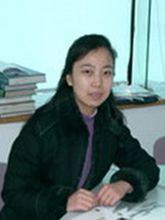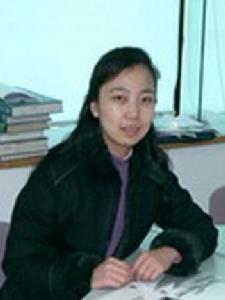人物簡介
 靳小怡
靳小怡靳小怡,女,教授,1973年4月 出生於陝西省西安市。 2003年3月獲西安交通大學管理學博士學位,2003年3月至2005年1月在西安交通大學經濟與金融學院套用經濟學專業進行博士後研究。現為西安交通大學211工程“管理創新”重點研究項目“複雜環境下的人口與社會政策創新”中擔任人口研究方向梯隊成員,教育部985 2 期“人口與經濟社會發展的政策與管理創新”國家社科創新基地“人口與經濟社會發展政策”方向研究成員。
主要經歷
1992年9月至1996年7月,西安交通大學人文學院英語系,科技英語專業,文學學士
1994年9月至1996年2月,西安交通大學管理學院國際貿易系 ,國際貿易專業,輔修
1996年9月至1999年4月,西安交通大學人文學院國際經濟系,馬克思主義理論教育專業,國際經濟研究方向,法學碩士
1999年3月至2003年4月,西安交通大學管理學院人口所,管理科學與工程專業,人口與經濟系統工程研究方向,管理學博士
2005年1月-2007年7月,西安交通大學公共政策與管理學院,人口與發展研究所,副教授
2005年5月-2006年8月,美國史丹福大學人口與資源研究所(Morrison Institute for Population and Resource Studies),博士後
2003年3月至2005年1月,西安交通大學經濟與金融學院,套用經濟學專業,博士後
2005年7月-11月,美國聖塔菲研究所(Santa Fe Institute),訪問學者
2007年1月,入選西安交通大學首屆“青年骨幹教師培養計畫”
2007年1月,認定為副博導
2007年9月至今,西安交通大學公共政策與管理學院,人口與發展研究所,教授、博導
2007年9月,教育部“新世紀人才支持計畫”。
2008年11月至今,西安交通大學,性別與發展研究中心,主任
2009年4月至今,教育部長江學者創新團隊骨幹成員
2009年6月至今,西安交通大學“卓越團隊支持計畫” 骨幹成員
學術兼職
2006年12月至今,中國社會學會社會網專業委員會會員
2007年6月至今,西安市人口學會理事。
2007年11月至今,中國人口學會理事。
教學工作
指導研究生情況(2004-):
獨立指導碩士生(17人):在讀7人(1人已獲學位); MPA 10人( 1人已獲學位)
獨立指導博士生(3人): 在讀3人
協助指導碩士生(9人):已畢業5人,直博2人,在讀2人
協助指導博士生(7人):已畢業2人,在讀5人
授課情況
2007.10-2008.1: 社會網路研究導論,研究生公共課,40學時(合作主講)
2006.9-2007.1: 人口學原理,本科生專業課,32學時
2007.3-2007.7: 人口學原理,本科生專業課,32學時
2009.2-:社會學原理,本科生專業課,48學時(合作主講)
科研情況
科研項目
主持課題
1. 2003年至2005年,“子女外出打工對農村老年人生活狀況的影響研究”,中國博士後科學基金,基金號:2003033510,經費1萬元。
2. 2005-2006,“深圳市外來農村流動人口研究”,深圳市委市政府項目,經費25萬元,兩主持人之一。
3. 2005-2007,“農村流動人口社會網路的再構建及其對婚育觀念與行為的影響:基於社會性別視角的研究”,國家社會科學基金,基金號:05CRK002,經費6萬元。
4. 2007年至2010年,“中國女性缺失與社會穩定:對國際安全的意義”,史丹福大學“校長國際研究創新基金”,與史丹福大學人類學系、生物學系、歷史學系和人口與資源研究所合作項目,資助經費30萬美元,兩主持人之一。
5. 2007年至2008年,“農村大齡男性的性問題研究”,法國國立人口研究中心,資助經費7500歐元,兩主持人之一。
6. 2007-2010,“中國農村流動人口社會網路的小團體結構研究”教育部新世紀優秀人才支持計畫(NCET-07-0668),經費20萬元。
7. 2004年至今,教育部985—2期“人口與經濟社會發展的政策與管理創新”國家社科創新基地,“人口與經濟社會發展政策”方向兩負責人之一。
8. 2008-2010,“中國農民工社會融合影響研究”,教育部留學回國人員科研啟動基金,經費2萬元。
9. 2009-2011,“中國性別失衡與社會穩定研究”,教育部社會科學重大攻關課題,子課題“性別失衡治理的國際比較研究”,及子課題“根治性別失衡、促進社會穩定的對策研究(B)” ,10萬元(兩主持人之一)
10. 2009-2011,“中國人口性別結構與社會可持續發展戰略研究”,國家社會科學基金重大攻關課題,子課題“性別結構失衡下不同個人與社區的脆弱性、失范與安全研究” 。
11. 2009-2011,“城鄉人口流動背景下農村大齡未婚男性的社會融合研究”,國家社會科學基金,基金號:09BRK009,經費10萬元。
參與課題
1. 2003-2006,“複雜環境下的人口與社會政策創新”,國家211工程項目,西安交通大學211工程“管理創新”重點研究項目子項目,經費55萬元,主要參與人
2. 2000年11月-2001年,“中國農村婚姻形式與養老研究”課題,國家計生委課題、與史丹福大學合作項目,經費23萬元,主要參與人(排名第3)。
3. 2004年3月-12月,國家人口發展戰略子課題“社會性別視角下面向弱勢群體保護與發展的人口戰略分析”,國家人口與計畫生育委員會,課題序號:C05-03,經費12萬元,主要參與人(排名第4)。
4. 2004年6月-2005年6月,“城市出生性別比偏高的機制研究——基於人口流動引起的生育觀念與行為演變的影響分析”,國家社會科學基金,基金號:04BRK001,經費7萬元,主要參與人(排名第2)。
5. 2002-2007,“中國的城鄉人口流動:文化擴散及其社會人口後果”,與美國史丹福大學、聖塔費研究所(Santa Fe Institute)、復旦大學合作研究項目,部分接受美國NIH基金資助(項目號AG017253-06),經費56萬元,主要參與人(排名第2)。
6. 2005-2007,“面向可持續發展的城鄉人口流動及其影響的理論與政策研究”國家社科基金重點項目,項目號-05ARK001,經費12萬元,主要參與人
7. 2007-2009,面向農民工社會融合的複雜社會網路模型研究與套用,國家自然科學基金項目(項目號:70671083),經費20萬,主要參與人(排名第3)。
8. 2006-2007,“國家關愛女孩行動啟動研究”,國家人口與計畫生育委員會項目,經費11萬元,主要參與人
9. 2007-2008,“促進中國性別平等與社會穩定的公共政策研究”,國家軟科學研究基金項目,項目號20042006GXS2B041,經費8萬元,主要參與人
10. 2009-2011,長江學者和創新團隊發展計畫,經費300萬,團隊骨幹成員
學術情況
國內
1. 2001年10月25日。 “中國健康老齡化研究國際論壇”,北京
2. 2002年5月27-23日,“第一屆信息與管理科學國際會議”(the First International Conference on Information and Management Sciences),西安,發表論文“Principle components analysis based on a modified neural networks”,作者:靳小怡
3. 2003年10月13-15日,“第四屆華裔老年人研究論壇”(The 4th International Symposium on Chinese Elderly),中國人口學會和中國人民大學人口與發展研究中心主辦,北京
4. 2004年5月10-11日,“人口視窗與健康老齡化:社會經濟的挑戰與機遇國際會議”(International Conference on Demographic Window and Healthy Ageing: Socioeconomic Challenges and Opportunities),國際人口科學聯盟(IUSSP)與北京大學健康老齡化與家庭研究中心主辦,北京
5. 2004年6月9-11日,“中國現代化進程中的人口遷移流動與城市化學術研討會”,中國人口學會和中國人民大學人口與發展研究中心主辦,北京
6. 2004年10月23-24日,人口與可持續發展戰略國際研討會,中國人口學會和上海市人口學會等主辦,上海。宣讀論文“社會網路與社會融合對農村流動婦女初婚的影響:來自上海浦東的調查發現”,作者:靳小怡等
7. 2004年11月15-24日,“海峽兩岸研究生論壇”,中山大學中華公共事務管理學會主辦,台灣。宣讀論文“全球化下的中國人口轉變及其社會文化影響”,作者:靳小怡
8. 2007年1月18-21日,第二屆社會網與關係管理研討會暨中國社會學會社會網專業委員會(籌)成立大會,哈爾濱工程大學,哈爾濱。
9. 2007年7月6-8日,第三屆中國人口學家前沿論壇,北京大學人口研究所、中國人口學會、聯合國人口基金會主辦,北京。
10. 2007年7月9-11日,聯合國社會性別基金第三批受資機構培訓會議,聯合國社會性別主題工作組,北京。
11. 2007年7月30日至8月1日,2007複雜系統暑期學校,北京,Santa Fe Institute和中科院理論物理研究所共同主辦,Population Dynamics: An Introduction,主講人。
12. 2007年8月31日至9月2日,第四屆亞太性與生殖健康權利大會籌備會(4th Asia Pacific Conference on Reproductive and Sexual Health and Rights29-31 October 2007; Hyderabad, India),北京,主題匯報“中國的出生性別比問題與綜合治理”(“Imbalanced Sex Ratio at Birth and Comprehensive Intervention in China”),匯報人。
13. 2007年10月20日,第八屆亞洲/大洋洲地區老年學和老年醫學大會國際合作主題小型研討會,南加州大學(USC)與北京大學主辦。
14. 2007年11月3-4日,“和諧社會視野下的中國人口與發展”研討會,《首屆中國中青年人口學者學術研討會》二十周年紀念,中國人口學會、江蘇省人口學會、江蘇省老年學會、南京大學、河海大學、南京人口學院聯合主辦,南京,擔任第20論壇評論員,宣講論文“社會網路對農民工初婚觀念和行為的影響:基於性別視角的研究”。
15. 2007年11月17-19日,第三屆全國“社會網及關係管理”研討會,中國社會學會主辦、南京理工大學經濟管理學院與南京大學管理學院承辦,南京,主講論文“農民工對婚前和婚外性行為的觀念:社會網路影響研究”。
16. 2008年5月23-24日,上海,第二次生育政策研討會。
17. 2008年8月21-23日,西安,中國人口學會年會
18. 2008年12月10-11日,北京,“社會變革中的當代中國家庭國際研討會”,中國社會科學院
19. 2009年3月7日,北京,“出生性別比問題及治理研討會”,中國社會科學院
20. Wei Yan and Xiaoyi Jin. 2009. Marriage Circle in Rural Area under Marriage Squeeze-- Expanding or Shrinking? Evidence from H County of Anhui Province in China. “Humanity, Development and Cultural Diversity”, The 16th Congress of IUAES, July 27-31, 2009, Kunming, China
21. Jin Xiaoyi and Lige Liu. 2009. Determinants of the Rural Men's Risk of First Marriage in China: From Perspective of Social Network. “Humanity, Development and Cultural Diversity”, The 16th Congress of IUAES, July 27-31, 2009, Kunming, China
國外
22. 2005年10月28日,美國聖塔菲研究所(Santa Fe Institute)系列研討會,“Social networks of rural-urban migrants in China: A study in Shenzhen”,主講人
23. 2005年11月18日,美國史丹福大學人口與資源研究所學術講座,“Social networks of Chinese rural-urban migrants: Evidence from Shenzhen”,主講人
24. 2006年1月12日,美國加州大學Irvine分校,學術研討會“Rural-urban Migration in China: Some Findings and Social Subgroup Detection”,主講人之
25. 2006年1月13日,美國加州大學Irvine分校,視頻學術研討會“Network Study on Rural-urban migration in China”(面向南加州四所大學——UCI, UCLA, UCSD, UCR),主講人之
26. 2006年1月25日,美國史丹福大學老年研究中心(CDEHA)學術講座,“Elder-care, Gender, and Son Preference: The role of cultural transmission and diffusion during the process of rural-urban migration in China.”Stanford University, CA. US., 主講人
27. 2006年10月7-8日,瑞典斯德哥爾摩未來研究所Social exclusion and integration: the situation of internal migrants in China Workshop學術報告 “The effects of rural-urban migration on intergenerational financial transfer in China: A gender-based perspective.” , 主講人
28. 2008年4月12-19日,法國國立人口研究中心,合作研究“性別歧視與人口社會後果” ,法國巴黎
29. 2009年2月25日-3月5日,美國史丹福大學,與史丹福大學人類學系、生物學系、歷史學系和人口與資源研究所合作項目“中國女性缺失與社會穩定”
30. 2009年2月26-27日,美國史丹福大學老年研究中心、亞洲研究中心, Aging Asia: Economic and Social Implications of Rapid Demographic Change in China, Japan, and Korea。
科研成果
所獲獎勵
1. 2004年1月,“中國農村男孩偏好文化的傳播及婚姻形式與養老的系統研究與政策分析”,獲西安交通大學首屆人文社會科學優秀科研成果獎一等獎,第二完成人;
2. 2006年12月,“中國農村招贅婚姻及其影響的系統研究——基於三個縣的比較分析”,獲全國婦聯、中國婦女研究會婦女/性別研究優秀博士論文獎二等獎;
3. 2007年1月,《當代中國農村的招贅婚姻》,國家人口與計畫生育委員會、中國人口學會第四屆中國優秀人口科學研究獎,專著類一等獎,第二完成人;
4. 2008年3月,陝西省教育系統五一巾幗標兵。
中文論文:
1. 靳小怡。 1997. 談國有產權代理制度改革的中心環節。 理論導刊(11)
2. 靳小怡。 1998. 公有制的實現形式與資本經營。 陝西財政(12)
3. 靳小怡, 李國平。 1999. 論亞洲金融危機生成機制的內動因。 人文雜誌 (5): 224-225
4. 李國平, 靳小怡, 許揚。 2000. 生產力要素分類與屬性分析。 生產力研究 (1-2): 47-49
5. 李樹茁、費爾德曼、圖加普卡, 李南、靳小怡,2002 ,“中國農村的男性偏好文化、婚姻類型和代際轉移”,蔡昉等主編,《中國人口年鑑2002》, pp243-262,中國社科院人口與勞動經濟研究所, 北京
6. 靳小怡, 李樹茁, 朱楚珠。 2002. 農村不同婚姻形式下家庭財富代際轉移模式的初步分析。 人口與經濟, (1): 18-24
7. 靳小怡。 2002. 中國社會轉型期養老危機研究。 西北大學學報(社科版)(1): 116-118
8. 靳小怡, 李樹茁。 2001. 中國社會轉型期老年人生活狀況研究。 西安交通大學學報(社科版)(2): 61-65
9. 李樹茁, 靳小怡, 費爾德曼。 2001. 中國農村婚姻形式和與父母共居時間關係研究。 中國人口科學(6): 16-22
10. 李樹茁, 靳小怡, 費爾德曼。 2002. 中國農村子女的婚姻形式和個人因素對分家的影響研究。 社會學研究 (4): 102-116
11. 李樹茁, 費爾德曼, 靳小怡。 2003. 兒子與女兒: 中國農村的婚姻形式和老年支持。 人口研究 (1): 67-75
12. 靳小怡, 李樹茁。 2003. 中國農村社區招贅婚姻研究。 人口與經濟(1):45-49
13. 靳小怡, 李樹茁, Marcus Feldman. 2004. 婚姻形式與生育水平:對中國農村三個縣的考察。 人口與經濟(5):54-59
14. 靳小怡, 李樹茁, Marcus Feldman. 2004. 婚姻形式與男孩偏好:對中國農村三個縣的考察。 人口研究(5):55-63
15. 靳小怡, 彭希哲, 李樹茁, 郭有德, 楊緒松。 2005. 社會網路與社會融合對農村流動婦女初婚的影響:來自上海浦東的調查發現。 人口與經濟(5):53-58
16. 李樹茁,靳小怡,費爾德曼。 2006. 當代中國農村的招贅婚姻及其人口與社會影響:來自三個縣的調查發現。 西安交通大學學報(社科版)(5):51-64.
17. 楊緒松, 靳小怡, 肖群鷹, 白萌。 2006. 農民工社會支持與社會融合的現狀及政策研究:以深圳市為例。 中國軟科學(12):18-26
18. 李樹茁,伍海霞,靳小怡,費爾德曼。 2006. 中國農民工的社會網路與性別偏好:基於深圳調查的研究。 人口研究(6):5-14
19. 李樹茁、楊緒松、靳小怡、費爾德曼、杜海峰。 2006. 中國鄉城流動人口社會網路複雜性特徵分析。 市場與人口分析(5): 13-22.
20. 李樹茁、楊緒松、任義科、靳小怡。 2006. 農民工社會網路對其職業階層與收入的影響:來自深圳調查的發現。 當代經濟科學(6):25-33
21. 李樹茁、楊緒松、悅中山、靳小怡。 2007. 中國農民工社會支持網路的現狀及其影響因素研究。 西安交通大學學報(社科版)(1):67-76
22. 張燁霞、靳小怡、費爾德曼。 2007. 中國城鄉遷移對代際經濟支持的影響:基於社會性別視角的研究。 中國人口科學(3):31-40
23. 靳小怡、任峰、悅中山。 2008. 農民工對婚前和婚外性行為的態度:基於社會網路的研究。人口研究(5):67-78.
24. 韋艷,靳小怡,李樹茁。 2008. 農村大齡未婚男性家庭壓力和應對策略研究——基於YC縣訪談的發現。 人口與發展(5):2-12
25. 靳小怡、任鋒、任義科、悅中山。 2009. 社會網路與農民工初婚:性別視角的研究。 人口學刊(4):23-33
26. 劉利鴿 靳小怡 姜全保 李樹茁。 2009.明清時期男性失婚問題及其治理。 浙江社會科學(已錄用)
27. 靳小怡 劉利鴿。 2009. 性別失衡下社會風險與行為失范的識別研究。 西安交通大學學報(社科版)(6)
英文論文:
1. Jin, Xiaoyi. 2002. “Principle components analysis based on a modified neural networks”。 In Kaoping Song et al. (eds.), Proceedings of the First International Conference on Information and Management Sciences: 109-111, China, Xi'an, May 27-31. ISSN: 1539-2023, Series of Information and Management Sciences, Vol. 1
2. Li Shuzhuo, Hu Ping and Jin Xiaoyi. 2002. “Enfants 'rois' et vieillards 'délaissés‘: Implications socioculturelles de la transition démographique en Chine.” LA CHINE AU SEUIL DU XXIe SI?CLE: Questions de population, questions de société。 Hella Courgeau. Paris. Institut National D' études Démographiques. ISSN: 2 7332-0148-4, 477-497.
3. Li Shuzhuo, Marcus Feldman, and Jin Xiaoyi. 2003. “Marriage form and family division in three villages in rural China.” Population Studies 57(1): 95-108.(SSCI) (中文論文英文版)
4. Jin Xiaoyi. 2003. “A method of principle components analysis using improved neural networks.” In Chen Jinxian et al. (eds.), Analects of Modern Management Science. Pp. 66-72. Xi'an Jiaotong University Press
5. Li Shuzhuo, Marcus Feldman, and Jin Xiaoyi. 2004. “Children, marriage form and family support for the elderly in contemporary rural China.” Research on Aging 26(3): 352-384. (SSCI) (中文論文英文版)
6. Li Shuzhuo and Jin Xiaoyi. 2004. Uxorilocal Marriage in Contemporary Rural China. Chinese Cross Currents (1): 64-79.
7. Jin Xiaoyi, Du Haifeng, He Wuhong, and Jiao Licheng. 2004. “Optimizing the weights of neural networks based on antibody clonal simulated annealing algorithm.” International Symposium on Neural Networks (ISNN2004)。 Lecture Notes in Computer Science, Springer, Part 1: 299-304 (SCI)
8. Jin Xiaoyi, and Du Haifeng. 2004. “A New Artificial Immune Algorithm for the 0-1 Knapsack Problem”。 Proceeding of 2004 International Conference on Management Science & Engineering (ISTP)
9. Du Haifeng and Jin Xiaoyi. 2004. Immune Clonal Selection Network. The 17th Australian Joint Conference on Artificial Intelligence: 840-852. (SCI)
10. Jin Xiaoyi, Du Haifeng, He Wuhong, Jiao Licheng. “Optimizing the weights of neural networks based on antibody clonal simulated annealing algorithm”。 The International Symposium Neural Networks (ISNN2004)。 (SCI, ISTP Index, IDS Number: BAT64)
11. Li Shuzhuo, Marcus Feldman, and Jin Xiaoyi. 2005. “Marriage form and duration of post-marital co-residence with parents in rural China: Evidence from Songzi.” Journal of Comparative Family Studies 36(1): 121-138. (SSCI) (中文論文英文版)
12. Marcus Feldman, Shuzhuo Li, Nan Li, Shripad Tuljapurkar and Xiaoyi Jin. 2005. “Son preference, marriage and intergenerational transfer in rural China.” In S. Bowles, H. Gintis, and M.A. Osborne (Eds), Unequal Chances: Family Background and Economic Success. (Chapter 8)。 Pp.232-255. Russell Sage, N.Y.
13. Marcus W. Feldman, Shropad Tuljapurkap, Shuzhuo Li, Xiaoyi Jin & Nan Li. 2006. “Son preference, marriage, and intergenerational transfer in rural China.” In Anne H. Gauthier et al. (eds.), Allocating Public and Private Resources Across Generations, (Chapter 6) Pp. 139–162.Springer. Printed in the Netherlands.
14. Jin Xiaoyi, Li Shuzhuo, and Marcus Feldman. 2006. “Marriage form and fertility in rural China: an investigation in three counties.” Population Research and Policy Review25: 141-156. (SSCI) (中文論文英文版)
15. Jin Xiaoyi, Li Shuzhuo, and Marcus Feldman. 2007. “Marriage form and age at first marriage: A comparative study in three counties in contemporary rural China.” Social Biology 52 (1-2): 18-46. (SSCI) (中文論文英文版)
16. Jin Xiaoyi, Li Shuzhuo, and Marcus Feldman. 2007. “Marriage Form and Son Preference in Rural China: An Investigation in Three Counties.” Rural Sociology 72 (4): 511-536. (SSCI) (中文論文英文版)
17. Du Haifeng, Marcus W. Feldman, Li Shuzhuo, and Jin Xiaoyi. 2007. “An algorithm for detecting community structure of social networks based on prior knowledge and modularity”。 Complexity 12(3):53-60. (SCI)
18. Wu Haixia, Marcus W. Feldman, Jin Xiaoyi and Li Shuzhuo. 2007. “Social network and son preference of rural-urban migrants in China: A case of Shenzhen”。 In Isabelle Attane et al. (eds.), Female Deficit in Asia: Trends and Perspectives. Pp. 229-245.
專著
1. 李樹茁、靳小怡、費爾德曼、李南、朱楚珠著,《當代中國農村的招贅婚姻》,中國社會科學文獻出版社,2006年。
2. 李樹茁、杜海峰、楊續松、靳小怡、費爾德曼著,《中國農民工的社會支持和社會融合》,中國社會科學文獻出版社,2007年。
3. 李樹茁、伍海霞、韋艷、靳小怡、費爾德曼著,《中國農民工的社會網路與生育》,中國社會科學文獻出版社,2008年。
國際會議宣讀的英文論文
1) Li, Shuzhuo, Hu Ping, and Jing Xiaoyi. 2001. “Social and cultural context of
demographic transition in China: Implications for the only children and the elderly.” Paper presented at the Conference of Population and Social Problems in Transitional China, January 28 - February 2, Paris, France.
2) Li, Shuzhuo, Marcus Feldman, and Jin Xiaoyi. 2001. “Gender, marriage and family support for the elderly in rural China.” Paper presented at the International Symposium on Healthy Aging Studies in China, October 25, Beijing, China.
3) Li, Shuzhuo, Jin Xiaoyi, and Marcus W. Feldman. 2002. “Gender, marriage, and
intergenerational support in rural China.” Paper presented at the International Conference on Allocation of Social and Family Resources in Changing Societies, December 4-6, Taibei.
4) Jin, Xiaoyi, Li Shuzhuo, and Marcus W. Feldman. 2004. “Marriage form and age at first marriage in rural China: A comparative studies of three counties”。 Paper presented at the 2004 Annual Meeting of Population Association of America, April 1-3, Boston, USA.
5) Feldman, Marcus W., Shuzhuo Li, and Xiaoyi Jin. 2004. “Children, marriage form and family support for the elderly in contemporary rural China”。 Paper presented at the Conference on Chinese Healthy Aging and Socioeconomics: International Perspectives, August 20-21, Duke University, USA.
6) Jin, Xiaoyi, Shuzhuo Li, and Marcus W. Feldman. 2006. “The effects of rural-urban migration on intergenerational financial transfer in China: A gender-based perspective.” Paper presented at the 2006 Annual Meeting of Population Association of America, March 30-April 1, Los Angeles, CA., USA.
7) Wu, Haixia, Shuzhuo Li and Xiaoyi Jin. 2006. “The evolution of son preference among rural-urban migrants in China: A research based on social network theory.” Paper presented at the 2006 Annual Meeting of Population Association of America, March 30-April 1, Los Angeles, CA., USA.
8) Wei Yan and Xiaoyi Jin. 2009. Marriage Circle in Rural Area under Marriage Squeeze-- Expanding or Shrinking? Evidence from H County of Anhui Province in China. “Humanity, Development and Cultural Diversity”, The 16th Congress of IUAES, July 27-31, 2009, Kunming, China
9) Jin Xiaoyi and Lige Liu. 2009. Determinants of the Rural Men's Risk of First Marriage in China: From Perspective of Social Network. “Humanity, Development and Cultural Diversity”, The 16th Congress of IUAES, July 27-31, 2009, Kunming, China
在國外研究機構的英文工作論文
1) Jin Xiaoyi, Marcus Feldman, Li Shuzhuo, and Zhu Chuzhu. 2001. “A survey of marriage form and family support for the elderly in Songzi, China.” Morrion Institute Working Paper Series 86, Stanford University.
2) Li Shuzhuo, Marcus Feldman, and Jin Xiaoyi. 2002. “Marriage form and duration of post-marital coresidence with parents in rural China: Evedence from Songzi.” Morrion Institute Working Paper Series 87, Stanford University.
3) Li Shuzhuo, Marcus Feldman, and Jin Xiaoyi. 2002. “Sons and daughters: Marriage form and family division in rural China.” Morrion Institute Working Paper Series 88, Stanford University.
4) Li Shuzhuo, Marcus Feldman, and Jin Xiaoyi. 2002. “Children, marriage and family support for the elderly in rural China.” Morrion Institute Working Paper Series 89, Stanford University.

